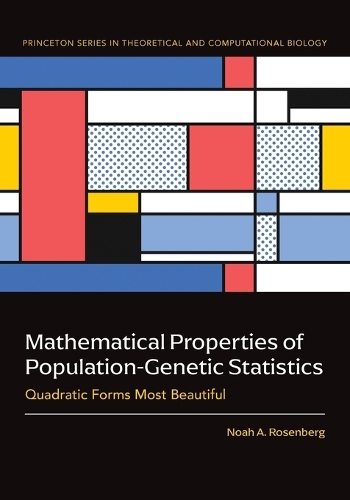
Mathematical Properties of Population-Genetic Statistics: Quadratic Forms Most Beautiful
(Paperback)
Available Formats
Publishing Details
Mathematical Properties of Population-Genetic Statistics: Quadratic Forms Most Beautiful
By (Author) Noah A. Rosenberg
Princeton University Press
Princeton University Press
27th August 2025
United States
Classifications
Tertiary Education
Non Fiction
Evolution / Evolutionary biology
Probability and statistics
577.88
Physical Properties
Paperback
184
Width 155mm, Height 235mm
Description
A powerful new approach to interpreting population-genetic data in evolution and ecology
Population genetics uses statistical analysis to catalog genetic variation among populations and species. Summary statistics computed from allele frequencies-mathematical functions that measure features of genetic similarity and diversity-are key to this global effort. Yet despite their widespread use in evolutionary biology, ecology, and conservation biology, their mathematical properties have largely been overlooked. This book shows how to use the mathematical bounds on summary statistics to make better interpretations of population-genetic data.
Noah Rosenberg discusses how the behavior of these statistics depends not only on the biology of the populations they seek to describe but also on the mathematical properties of the functions used to compute them, properties that produce constraints on the values of the statistics and influence their interpretation. Focusing on the concept of homozygosity-a quadratic function of allele frequencies in a population-he demonstrates how to account for mathematical constraints when measuring genetic similarity and diversity. Rosenberg illustrates the results using examples from empirical data and shares strategies that readers can use to apply this mathematical perspective to different kinds of summary statistics, including those for measuring biodiversity in ecological communities.
Drawing inspiration from Charles Darwin, who marveled at evolution's "endless forms most beautiful and most wonderful," this book presents a groundbreaking approach to the study of genetic variation. It is sure to stimulate new research in population biology and deeper thinking about the meaning and interpretation of essential measurements of the world's genomes.
Author Bio
Noah A. Rosenberg holds the Stanford Professorship in Population Genetics and Society at Stanford University and is the editor-in-chief of the journal Theoretical Population Biology.
